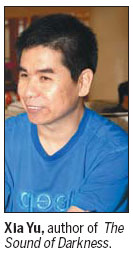Books
A reading light at the end of a long dark tunnel
Updated: 2011-08-12 08:18
By Yang Guang (China Daily)

Xia Yu's autobiographical essay collection The Sound of Darkness is an immense dark cave, resounding with detonations, shrill sirens and harrowing wails.
The 47-year-old recounts in the collection his coming of age, from being a miner to a journalist. He tells of the experiences, of his fellow miners, migrant workers and other grassroots groups he encountered along the way.
"I am kidnapped by real life, and at the same time redeemed by it," he says.
By real life, he means darkness.
"Darkness enables me to see the world both within and without."
Xia grew up in a miner's family in Datong, Shanxi province. He says the scenes of his childhood - miners in their dirty uniforms carrying injured fellow workers, panting and bleeding, scuttling toward the hospital in the light of the unclouded sun - haunt him even today.
At senior high school, Xia was given a key to the school library because his teacher appreciated his compositions. He devoured all the books he was interested in within three months, mostly European and Russian novels.
He says he was not a "good" student - though he did score good marks in exams. With little chance of being admitted to a university, he dropped out of school in the second year, to take his retired father's position as a miner.
He was assigned to watch over the underground power supply system, because he was short and thin. When his mother learned he had to go underground, her hair turned gray and her teeth loosened overnight.
"There were times that I walked in the long tunnel alone with a miner's lamp, and could see no farther than 5 meters," he recalls.
But his dream of becoming a writer never died in the darkness. He read during work breaks in the day, and wrote in the dim light on the kang (heated bed) back home at night.
But the pieces he submitted for publication were constantly sent back.
"Most at work didn't understand why I kept reading and writing," he says, "and I was ridiculed when they saw those rejection letters."
He sometimes skipped work to wander in the mountains, dreaming of escaping to somewhere with air and sunshine. When he was dispatched to work in a more remote coalmine, he was determined to leave.
Xia published his first short story in 1992, and got the chance to study at Lu Xun Literature Academy in Beijing in 1996, at the recommendation of Liu Qingbang, writer of the Lao She Literature Prize-winning Sacred Wood, whose film adaptation Blind Shaft won the Silver Bear at the 2003 Berlin Film Festival.
He had to bribe his coalmine boss with expensive liquor and cigarettes to get his consent to make the trip.
And he didn't return but stayed in Beijing when the one-year stint ended.
After working on and off as book editor at a few culture companies, he finally became a features journalist at Southern Weekly, one of the country's best-known and widely circulated weekly newspapers, in 2002.
The Sound of Darkness is a retrospective of Xia's works over the years.
"I have been trying to purge the darkness life has imposed on me and recover the light inherent in my nature," he says.
China Daily

Specials

Star journalist leaves legacy
Li Xing, China Daily's assistant editor-in-chief and veteran columnist, died of a cerebral hemorrhage on Aug 7 in Washington DC, US.

Beer we go
Early numbers not so robust for Beijing's first international beer festival

Lifting the veil
Beijing's Palace Museum, also known as the Forbidden City, is steeped in history, dreams and tears, which are perfectly reflected in design.